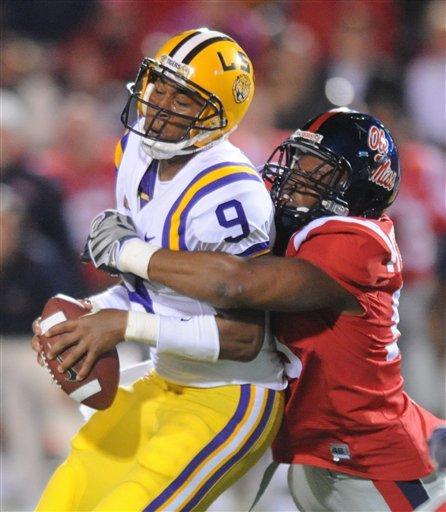OXFORD, Miss. — It came down to one second of one drive.
Down by two points, sophomore quarterback Jordan Jefferson and the LSU offense stood at the Ole Miss 32-yard line Saturday, in prime position to win the game after the offense was lifeless for most of the day.
The turn of events that led to the game’s final outcome left the team and fans in sheer disbelief.
On second down, Jefferson inexplicably took a sack – his fourth of the day – for a loss of nine yards that knocked LSU out of field goal range with 32 seconds to play.
LSU went backward again on the next play, a swing pass to sophomore running back Stevan Ridley that lost seven yards.
Rather than call the team’s final timeout immediately after the play was finished, the clock ran all the way down to nine seconds, leaving LSU with only one option for victory – a Hail Mary pass to the end zone – which junior wide receiver Terrance Toliver caught five yards short of the goal line.
The game clock read one second.
The field goal unit remained on the sideline, and time expired with the score staring LSU in the face – Ole Miss 25, LSU 23.
Miles was asked after the game why the coaches called passing plays instead of running plays when the team was in field goal range. Senior running back Keiland Williams was out of the game with an apparent broken bone in his ankle.
“We suggested a run, but [offensive coordinator] Gary [Crowton] had a good thought that the ball would be incomplete at worst,” Miles said. “We didn’t want to turn it over, and we lost a runner and were down to Ridley, who in my opinion would have done a great job right there.”
Ridley said he thought LSU would call a timeout sooner after his pass lost seven yards.
“I was expecting a timeout, but it didn’t happen,” Ridley said. “We were unprepared for the situation that came up … If we would have done things differently, maybe we would have had a different outcome.”
Miles said there was confusion with trying to call a timeout sooner, causing 17 precious seconds to evaporate from the game clock.
“I heard timeouts being called verbally,” Miles said. “I’m repeating, but I’m not getting it to the official apparently. Those seconds that ticked off before would have certainly made a difference because if we [spike] the ball, we then have the opportunity to kick the field goal to win.”
With one second to play, Jefferson said the “signal-caller” told him to spike the ball.Miles said there was no chance to spike the ball, and he took responsibility for the fiasco that led to LSU’s third loss of the season.
“The blame without question is when my quarterback needs to throw it away, and we’re calling a timeout to save as much clock time as we can, but then we’re late to the field, Miles said. “That was my mistake. It’s my fault we didn’t finish first in that game.”
The winning points for Ole Miss came on a halfback pass from senior wide receiver Dexter McCluster to Shay Hodge, McCluster’s first career completion, with 13:33 left in the game.
—-Contact Rachel Whittaker at [email protected]
FINAL: Tigers’ rally comes up short in 25-23 loss
November 21, 2009

LSU’s Jordan Jefferson (9) is sacked by Mississippi’s Emmanuel Stephens as time winds down in the fourth quarter during their NCAA college football game on Saturday, Nov. 21, 2009 in Oxford, Miss.





